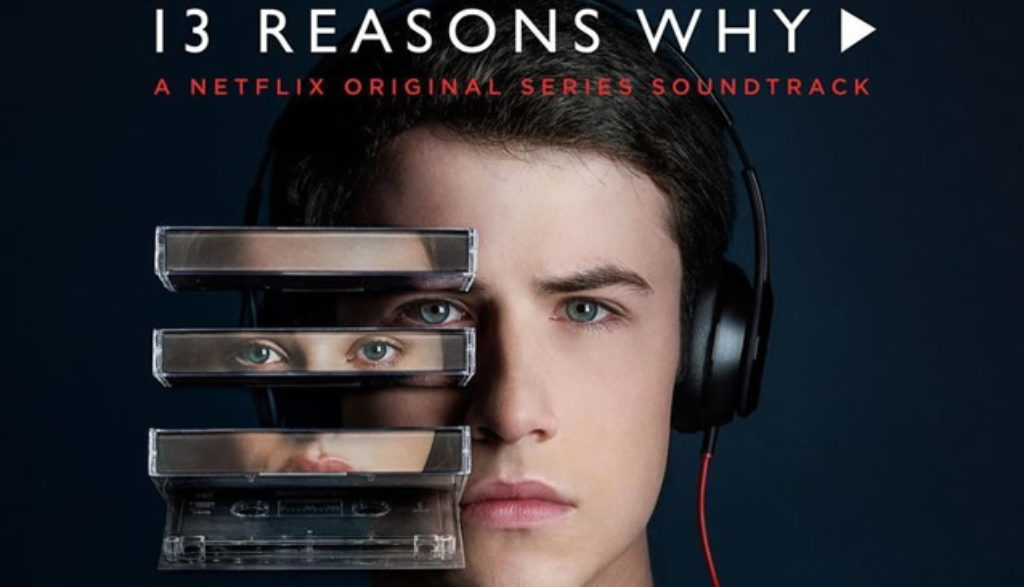
The Netflix drama 13 Reasons Why deals with an important but very sensitive subject: teen suicide. In the show, a teen girl sends messages (on cassette) to each of the 13 people whom she feels contributed to her decision to take her own life.
Singer and actress Selena Gomez co-produced the adaptation of the book (Thirteen Reasons Why). She’s defended it amid a growing concern that the show’s graphic depiction of suicide might have the opposite effect than intended—potentially influencing unstable teens to take their own lives instead of prompting them to talk about that tragic choice.
Given such heavy subject matter, it’s hardly suprising that the series’ official soundtrack is a low-key, melancholy one. What is a bit more surprising is that in addition to tracks from current artists (such as Gomez herself), the soundtrack’s curators have also chosen select songs from ’80s New Wave and alternative acts such as The Cure, The Alarm, The Call and Joy Division.
But there’s little joy on this album. Instead, the 13 tracks for the soundtrack of 13 Reasons Why arguably intensify the issue that the show itself has: making suicide look like a romantic choice.

Gomez’s track “Kill Em With Kindness—Acoustic” includes some of the albums few truly positive lyrics. She rebukes someone (perhaps an ex) for being proud, angry and deceptive. She also encourages dealing with life’s relational rifts by being kind: “The world can be a nasty place/ … We don’t have to fall from grace/Put down the weapons you fight with/And kill ’em with kindness.”
On Sir Sly’s “High” we hear, “It feels good for the first time in a long time now/It feels good to be me.” Another lyric suggests determination in the face of hardship: “A monument to love unspoken/Carved into stone, ‘Unwilling to come undone.'”
Ghostly, sad “Only You” by Selena Gomez mourns the loss of a cherished relationship: “All I needed was the love you gave,” she sings. While that vulnerable sentiment isn’t necessarily terribly problematic on its own, the bleak song as a whole has a despairing vibe to it. Elsewhere Gomez’s lyrics hint at an emotionally disoriented young woman struggling to cope with what’s happened: “This is gonna take a long time/And I wonder what’s mine/Can’t take no more.”
On “Bored,” Billie Eilish describes deeply dysfunctional dynamics in a romance with someone who’s self-centered and manipulative. Her self-awareness is a good thing, but her unwillingness to jettison the damaged and damaging relationship isn’t (assuming that this couple isn’t married, which they don’t seem to be). “I’m home alone,” she sings. “You? God knows where/I hope you don’t think that s—‘s fair.”
Joy Division’s “Love Will Tear Us Apart” paints a bleak portrait of a relationship that’s gone stone cold. Though two people share a bed (“Why is the bedroom so cold?/You’ve turned away on your side/ … You cry out in your sleep”), it’s clear that their emotional intimacy has long since evaporated, leaving only despair and loneliness in its place: “Emotions won’t grow/And we’re changing our ways, taking different roads/ … And there’s a taste in my mouth/As desperation takes hold.” The grimly pessimistic lyric “love will tear us apart” is repeated eight times.
Chromatics 2012 song “Into the Black” is yet another cover of Neil Young’s famous 1979 song “Hey Hey, My My (Into the Black).” While there are competing interpretations of the song’s key lyrics, the iconic line, “It’s better to burn out than to fade away” could be heard as an endorsement of suicide. (Indeed, Nirvana frontman Kurt Cobain quoted that line in his own suicide note.)
Regret and loss lurk in the lyrics of Lord Huron’s 2015 song “The Night We Met,” on which a man regrets ever meeting someone who shattered his heart (“I don’t know what I’m supposed to do/Haunted by the ghost of you”). (That song also includes the album’s only other profanity, one use of “h—.”) Likewise, despair and self-condemnation permeate The Japanese House’s song “Cool Blue” in the wake of another ruptured relationship. Meanwhile, The Cure’s 1989 “Fascination Street” seems to be about a depressed couple who try to cope with their emptiness by going to dance clubs together. Still more death fills “The Stand,” a 1984 song by The Alarm that’s reportedly based on characters and circumstances in Stephen King’s fantasy novel of the same name.
On Hamilton Leithauser + Rostam’s song “A 1000 Times,” an unstable man struggling with unrequited love apparently wanders the streets: “I walked from noon until the night/ … I found your house, I didn’t even try/They’d closed the shutters, they’d pulled the blinds/My eyes were red, the streets were bright.”
The gothic “The Killing Moon” (by Roman Remains) narrates the story of a woman who is seduced and then killed (whether literally or metaphorically is unclear) by her lover: “So cruelly you kissed me/Your lips a magic world/Your sky all hung with jewels/The killing moon will come to soon.” Elsewhere in the song we hear, “I know it must be/The killing time, unwillingly mine.”
The title of Sir Sly’s “High” could be heard literally: “I’ve been smoking on the peace pipe/ … I’m high, staring at the ceiling.”
The images, ideas and suggestions we see onscreen (whether the big screen or smaller ones) can powerfully shape our decisions and values. Study after study (chronicled by Plugged In in our Culture Clips section for nearly 20 years now) show correlations between what young people are exposed to in entertainment and the choices they make.
And that’s exactly why many experts are concerned about the series 13 Reasons Why. In Florida’s Palm Beach County Schools last week, parents got a letter from school administrators that said, “School District personnel have observed an increase in youth at-risk behavior at the elementary and middle school levels to include self-mutilation, threats of suicide, and multiple Baker Act incidents. … Students involved in the recent incidents have articulated associations of their at-risk behavior to the 13 Reasons Why Netflix series.”
As powerfully suggestive as shows like this might be, there’s another potential threat lurking in the music that accompanies them. The soundtrack for 13 Reasons Why is sonically somber, with sad song after sad song talking about death, despair and broken relationships. Long after teens have finished watching this show and moved on to something else, they may still be engaging with this soundtrack’s hollow, haunted worldview, one in which hope and purpose are in scarily short supply.
And for anyone grappling with the temptation of suicide, that’s probably not the kind of music that’s going to help them get to a better, healthier mental frame of mind.

After serving as an associate editor at NavPress’ Discipleship Journal and consulting editor for Current Thoughts and Trends, Adam now oversees the editing and publishing of Plugged In’s reviews as the site’s director. He and his wife, Jennifer, have three children. In their free time, the Holzes enjoy playing games, a variety of musical instruments, swimming and … watching movies.